English USA Lesson 32 Giving the Specific Time of Events
- 格式:doc
- 大小:45.00 KB
- 文档页数:7
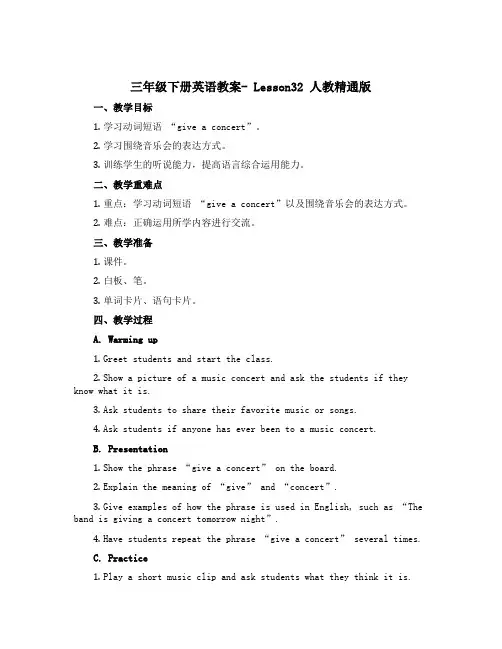
三年级下册英语教案- Lesson32 人教精通版一、教学目标1.学习动词短语“give a concert”。
2.学习围绕音乐会的表达方式。
3.训练学生的听说能力,提高语言综合运用能力。
二、教学重难点1.重点:学习动词短语“give a concert”以及围绕音乐会的表达方式。
2.难点:正确运用所学内容进行交流。
三、教学准备1.课件。
2.白板、笔。
3.单词卡片、语句卡片。
四、教学过程A. Warming up1.Greet students and start the class.2.Show a picture of a music concert and ask the students if they know what it is.3.Ask students to share their favorite music or songs.4.Ask students if anyone has ever been to a music concert.B. Presentation1.Show the phrase “give a concert” on the board.2.Explain the meaning of “give” and “concert”.3.Give examples of how the phrase is used in English, such as “The band is giving a concert tomorrow night”.4.Have students repeat the phrase “give a concert” several times.C. Practice1.Play a short music clip and ask students what they think it is.2.Introduce new vocabulary words such as “musician”, “singer”, “guitar” and “drums”.3.Show pictures of different musicians or bands and ask students to name them.4.Ask students to write down the names of three musicians or bands they know in English.5.Have students work in pairs and ask each other questions about their favorite musicians or bands using the new vocabulary words and the phrase “give a concert”.D. Production1.Divide the class into small groups and ask them to plan a music concert.2.Each group should choose a theme or genre for their concert.3.Have students discuss and decide on the musicians or bands they would like to invite to perform.4.Ask students to write down the names of the musicians or bands and their reasons for choosing them.5.Each group should present their concert plan to the class, including the theme, the musicians or bands they have chosen, and the reasons for their choices.E. Wrap-up1.Summarize the key points of the lesson.2.Ask students to share one thing they have learned today.3.End the class with a song or music clip related to the lesson.五、教学反思通过这节课的教学,学生能够学习到围绕音乐会的表达方式,并掌握新的动词短语。
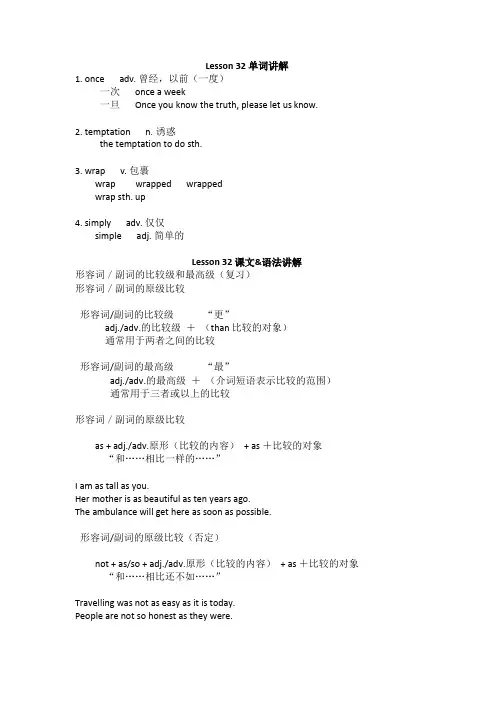
Lesson 32 单词讲解1.once adv. 曾经,以前(一度)一次once a week一旦Once you know the truth, please let us know.2.temptation n. 诱惑the temptation to do sth.3.wrap v. 包裹wrap wrapped wrappedwrap sth. up4.simply adv. 仅仅simple adj. 简单的Lesson 32 课文&语法讲解形容词/副词的比较级和最高级(复习)形容词/副词的原级比较形容词/副词的比较级“更”adj./adv.的比较级+(than 比较的对象)通常用于两者之间的比较形容词/副词的最高级“最”adj./adv.的最高级+(介词短语表示比较的范围)通常用于三者或以上的比较形容词/副词的原级比较as + adj./adv.原形(比较的内容)+ as +比较的对象“和……相比一样的……”I am as tall as you.Her mother is as beautiful as ten years ago.The ambulance will get here as soon as possible.形容词/副词的原级比较(否定)not + as/so + adj./adv.原形(比较的内容)+ as +比较的对象“和……相比还不如……”Travelling was not as easy as it is today.People are not so honest as they were.1.People are not so honest as they once were.2.The temptation to steal is greater than ever before -- especially in large shops.3.One Monday, there were fewer people in the shop than usual when the woman came in, so it was easier for the detective to watch her.4.After a little time, she chose one of the most expensive dresses in the shop and handed it to an assistant who wrapped it up for her as quickly as p ossible.choose chose chosenhand sth. to sb.5.Then the woman simply took the parcel and walked out of the shop without paying.6.When she was arrested, the detective found out that the shop assistant was her daughter.Lesson 32 知识拓展本课重点:形容词副词的原级比较as … as …I am as tall as you.People are not so (as) honest as they were.形容词副词的原级比较as … as …as … as possibleI will get back to you as soon as possible.You have to do the work as perfectly as possible.as … as one can形容词副词的原级比较as …as …表示比喻I am working as busy as a bee.I can easily pick the box up. It is as light as a feather.Your hands are as cold as ice. Come near the fire.。
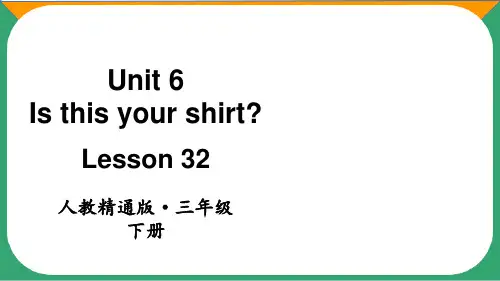
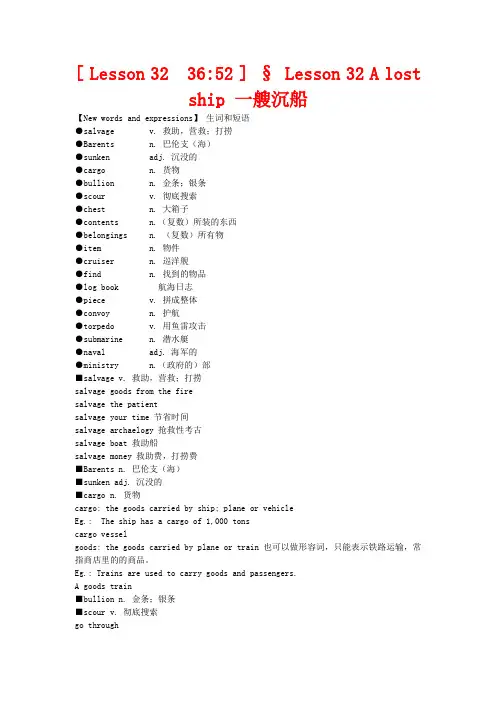
[ Lesson 32 36:52 ] § Lesson 32 A lostship 一艘沉船【New words and expressions】生词和短语●salvage v. 救助,营救;打捞●Barents n. 巴伦支(海)●sunken adj. 沉没的●cargo n. 货物●bullion n. 金条;银条●scour v. 彻底搜索●chest n. 大箱子●contents n.(复数)所装的东西●belongings n. (复数)所有物●item n. 物件●cruiser n. 巡洋舰●find n. 找到的物品●log book 航海日志●piece v. 拼成整体●convoy n. 护航●torpedo v. 用鱼雷攻击●submarine n. 潜水艇●naval adj. 海军的●ministry n.(政府的)部■salvage v. 救助,营救;打捞salvage goods from the firesalvage the patientsalvage your time 节省时间salvage archaelogy 抢救性考古salvage boat 救助船salvage money 救助费,打捞费■Barents n. 巴伦支(海)■sunken adj. 沉没的■cargo n. 货物cargo: the goods carried by ship; plane or vehicleEg.: The ship has a cargo of 1,000 tonscargo vesselgoods: the goods carried by plane or train 也可以做形容词,只能表示铁路运输,常指商店里的的商品。
Eg.: Trains are used to carry goods and passengers.A goods train■bullion n. 金条;银条■scour v. 彻底搜索go throughThe house has been searched / scoured for the hidden bullion. scour / search / hunt (都可与for 搭配,表示目的)search 指寻找丢失的东西或被认为是存在的东西,比look for更正式hunt 指漫无边际的寻找急需要的东西scour 表示彻底地搜查一个特定范围并暗示花费更大的力气Eg.: I have been searching everywhere, but I can’t find the key.We spent a week hunting for the puma.L31-04_32-01 end 10’56”L32-02 begin10’13”They scoured the woods for the child.scour / search / hunt (都可与for 搭配,表示目的)■chest n. 大箱子chest: a large strong box in which valuable objects are kept case 衣箱(总称)suitcase 手提箱safe 保险箱trunk 汽车尾箱dustbin 垃圾箱■contents n.(复数)所装的东西■belongings n. (复数)所有物■item n. 物件■cruiser n. 巡洋舰■find n. 找到的物品find: Something good or valuableEg.: the little restaurant is quite a find.The garden is a good find.■log book 航海日志■piece v. 拼成整体part / a piece of cake / a piece of newspiece: put parts together to form a wholepiece together 拼揍Eg.: They piece the log book together.piece up 修补,拼合Please piece up the dress.piece a quilt■convoy n. 护航in convoy 护航under convoy: 被护航■torpedo v. 用鱼雷攻击■submarine n. 潜水艇前缀sub-1. 下subway 地铁substructure 下层建筑subsoil 下层土subnormal 低于正常的2.次;准;亚subtripicssubcollegesubcontinent3. 副;分支;下级;下属subeditor 副编辑subagent 副代理人subhead 副标题suboffice 分办事处4.接近的subadult 接近成人的subteen 将近十三岁的subequal 接近相等的5.再subdived 再分sublet 转租subculture 再培养■naval adj. 海军的navy 海军naval port 军港naval power 制海权voyage 海上航行navigation 航海术navigate v. 航海,航行■ministry n.(政府的)部【Text】Lesson 32 A lost ship 一艘沉船Listen to the tape then answer the question below.Did the crew of the Elkor find what they were looking for?Why?The salvage operation had been a complete failure. The smallship, Elkor, which had been searching the Barents Sea forweeks, was on its way home. A radio message from the mainlandhad been received by the ship's captain instructing him togive up the search. The captain knew that another attempt would be made later, for the sunken ship he was trying to find had been carrying a precious cargo of gold bullion.Despite the message, the captain of the Elkor decided to try once more. The sea bed was scoured with powerful nets and there was tremendous excitement on board when a chest was raised from the bottom. Though the crew were at first under the impression that the lost ship had been found, the contents of the chest proved them wrong. What they had in fact found was a ship which had been sunk many years before.The chest contained the personal belongings of a seaman, Alan Fielding. There were books, clothing and photographs,together with letters which the seaman had once received from his wife. The captain of the Elkor ordered his men to salvage as much as possible from the wreck. Nothing of value was found, but the numerous items which were brought to the surface proved to be of great interest. From a heavy gun that was raised, the captain realized that the ship must have been a cruiser. In another chest, which contained the belongings of a ship's officer, there was an unfinished letter which had been written on March 14th, 1943. The captain learnt from the letter that the name of the lost ship was the Karen. The most valuable find of all was the ship's log book, parts of which it was still possible to read. From this the captain was able to piece together all the information that had come to light. The Karen had been sailing in a convoy to Russia when she was torpedoed by an enemy submarine. This was later confirmed by a naval official at the Ministry of Defence after the Elkor had returned home. All the items that were found were sent to the War Museum. 参考译文打捞工作彻底失败了。
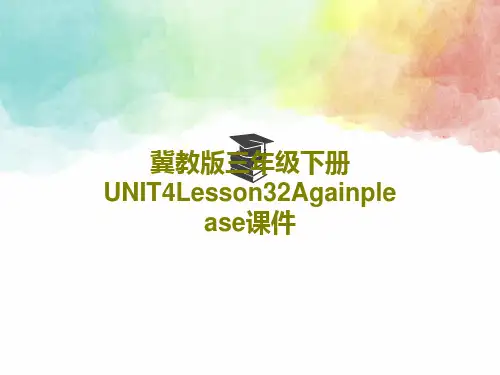
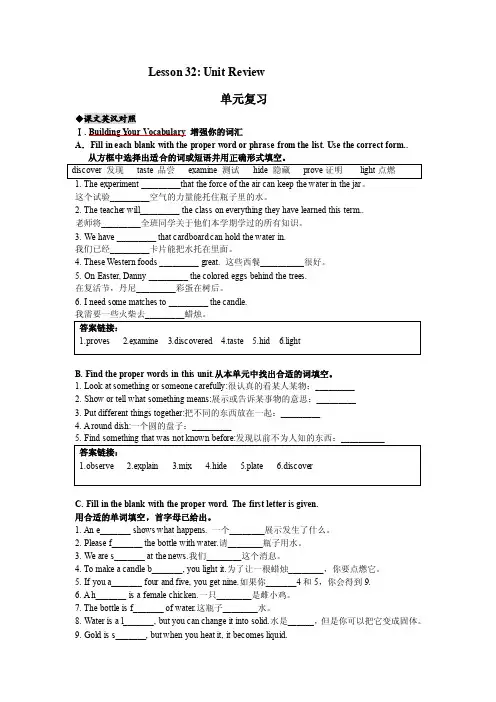
Lesson 32: Unit Review单元复习◆课文英汉对照Ⅰ. Building Y our Vocabulary 增强你的词汇A.Fill in each blank with the proper word or phrase from the list. Use the correct form..从方框中选择出适合的词或短语并用正确形式填空。
这个试验_________空气的力量能托住瓶子里的水。
2. The teacher will_________ the class on everything they have learned this term..老师将_________全班同学关于他们本学期学过的所有知识。
3. We have _________ that cardboard can hold the water in.我们已经_________卡片能把水托在里面。
4. These Western foods _________ great. 这些西餐__________很好。
5. On Easter, Danny _________ the colored eggs behind the trees.在复活节,丹尼_________彩蛋在树后。
6. I need some matches to _________ the candle.B. Find the proper words in this unit.从本单元中找出合适的词填空。
1. Look at something or someone carefully:很认真的看某人某物:_________2. Show or tell what something means:展示或告诉某事物的意思:_________3. Put different things together:把不同的东西放在一起:_________4. A round dish:一个圆的盘子:_________C. Fill in the blank with the proper word. The first letter is given.用合适的单词填空,首字母已给出。
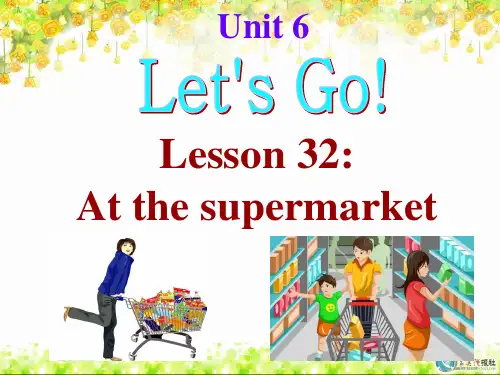
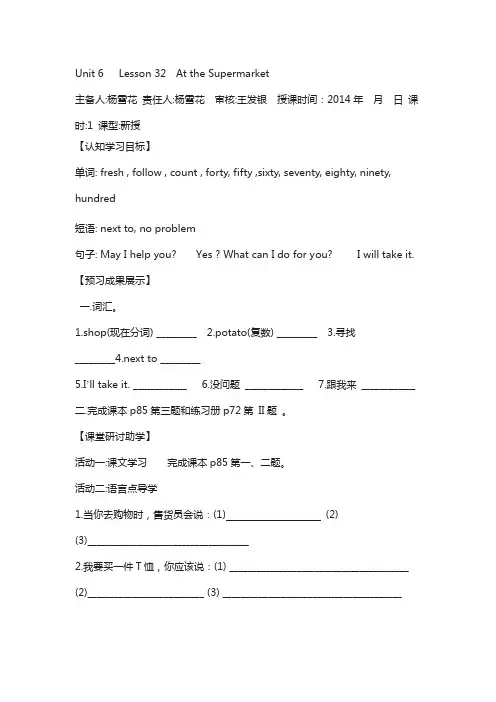
Unit 6 Lesson 32 At the Supermarket主备人:杨雪花责任人:杨雪花审核:王发银授课时间:2014年月日课时:1 课型:新授【认知学习目标】单词: fresh , follow , count , forty, fifty ,sixty, seventy, eighty, ninety, hundred 短语: next to, no problem句子: May I help you? Yes ? What can I do for you? I will take it.【预习成果展示】一.词汇。
1.shop(现在分词) _________2.potato(复数) _________3.寻找_________4.next to _________5.I’ll take it. ____________6.没问题_____________7.跟我来____________二.完成课本p85第三题和练习册p72第II题。
【课堂研讨助学】活动一:课文学习完成课本p85第一、二题。
活动二:语言点导学1.当你去购物时,售货员会说:(1) (2)(3)____________________________________2.我要买一件T恤,你应该说:(1) ________________________________________ (2)__________________________ (3)________________________________________3.问价钱是多少,你应该说:(1).________________________(2).__________________________4.在你决定要买某物时,你应该说:_____________ . 【当堂训练检测】一.单项选择。
( )1.Li Ming wants _______ a T-shirt. A to buy to B buys C buy to D to buy( )2.Mrs Wang wants to buy _________ vegetables. Do you have___________ potatoes?A some; anyB any; someC any; anyD some; some( )3.---_________ is this dress? ---Sixty-five yuan.A How muchB How manyC HowD How long( )4.They are next ________ the carrots. A at B in C to D of( )5. 6.---____________? ---I’m looking for a dress.A.How much is it?B.What do you like to do?C.What do you do?D.What can I do for you?二.句型转换。
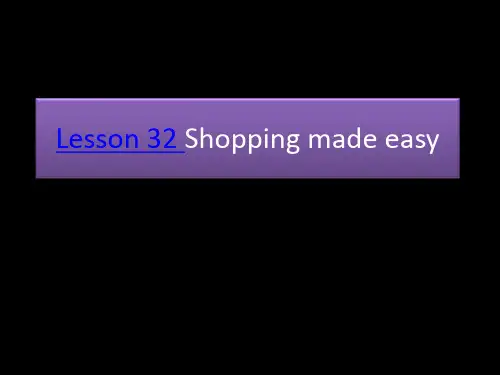
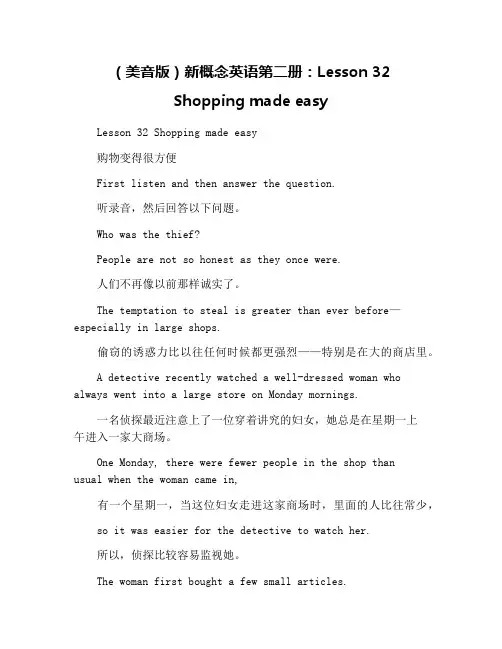
(美音版)新概念英语第二册:Lesson 32Shopping made easyLesson 32 Shopping made easy购物变得很方便First listen and then answer the question.听录音,然后回答以下问题。
Who was the thief?People are not so honest as they once were.人们不再像以前那样诚实了。
The temptation to steal is greater than ever before—especially in large shops.偷窃的诱惑力比以往任何时候都更强烈——特别是在大的商店里。
A detective recently watched a well-dressed woman who always went into a large store on Monday mornings.一名侦探最近注意上了一位穿着讲究的妇女,她总是在星期一上午进入一家大商场。
One Monday, there were fewer people in the shop thanusual when the woman came in,有一个星期一,当这位妇女走进这家商场时,里面的人比往常少,so it was easier for the detective to watch her.所以,侦探比较容易监视她。
The woman first bought a few small articles.这位妇女先是买了几样小商品。
After a little time, she chose one of the most expensive dresses in the shop and handed it to an assistant who wrapped it up for her as quickly as possible.过了一会儿,她又选了商场里最昂贵的一件衣服,把它递给了售货员。
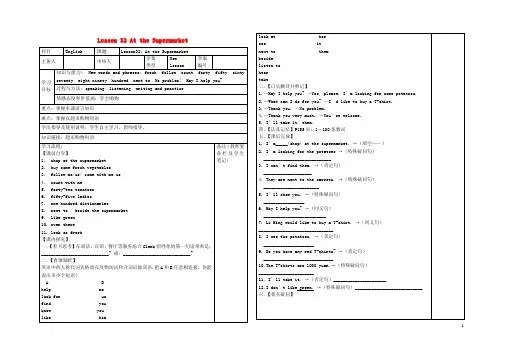
Lesson 32 A lost ship⼀艘沉船Listen to the tape then answer the question below.听录⾳,然后回答以下问题。
Did the crew of the Elkor find what they were looking for? why?The salvage operation had been a complete failure.打捞⼯作彻底失败了。
The small ship, Elkor, which had been searching the Barents Sea for weeks, was on its way home.⼩船“埃尔科”号在巴伦⽀海搜寻了⼏个星期之后,正在返航途中。
A radio message from the mainland had been received by the ship's captain instructing him to give up the search.返航前,该船船长收到了⼤陆发来的电报,指⽰他们放弃这次搜寻。
The captain knew that another attempt would be made later,船长知道⽇后还会再作尝试,for the sunken ship he was trying to find had been carrying a precious cargo of gold bullion.因为他试图寻找的沉船上载有⼀批珍贵的⾦条。
Despite the message, the captain of the Elkor decided to try once more.尽管船长接到了电报,他还是决定再试⼀试。
The sea bed was scoured with powerful nets and there was tremendous excitement on board when a chest was raised from the bottom.他们⽤结实的把海床搜索了⼀遍。
高中英语听力Lesson 32Muslim and Arab Leaders Call for Calm in Cartoon Controversyhttp:///res/2007-12-28/r291382.html请点击此地址下载播放器播放英语听力Key words1. caricature 讽刺漫画2. forgiveness 宽恕3. equal … to 把……等同于4. horrible 可怕的5. prophet 先知;预言家6. emissary 使者7. be prone to 易于……的8. discreetly 谨慎地9. water cannons 水炮10. unruly 难驾驭的;难控制的Exercises:I. Answer the following questions with the information you have heard from the news.1. Where were the caricatures of the prophet Mohammed originated?2. In another interview on CNN, what did Saudi Ambassador to Washington call on Muslims to do?3. Which country was the latest country to see a violent outburst in reaction to the political cartoons?II. Complete the statements with the information you have heard from the news.1. And no newspaper or TV in any other country should do it ______________________.2. We, as much as we condemn it strongly, must stay above this dispute, and not bring ourselves to __________________ the cartoons.3. The kingdom is not a country that is prone to violent public demonstrations. People express their ________________________.听力原文:Afghan President Hamid Karzai says he condemns the caricatures of the prophet Mohammed. He says Muslims all over the world are angry. “There is no point in trying to insult the sentiments of cultures or religions – any culture, any religion. No newspaper in our country should do a thing like that with regard to other religions. And no newspaper or TV in any other country should do it with regard to other religions.”During an appearance on CNN’s Late Edition program, President Karzai said that he has discussed the matter with the prime minister of Denmark, where the cartoons originated. Heindicated an apology is not enough, and he would like to see those responsible lose their jobs. But at the same time, he noted that Islam teaches forgiveness, and he urged his fellow Muslims to do just that. “We, as much as we condemn it strongly, must stay above this dispute, and not bring ourselves to equaling ourselves to those publishing the cartoons.”In another interview on CNN, Saudi Ambassador to Washington Turki Al-Faisal called the caricatures offensive and a horrible depiction of the prophet. But he, too, called on Muslims to show restraint and resolve the controversy quietly. He said, in Saudi Arabia, those offended by the cartoons sent emissaries to meet with Danish officials. “The kingdom is not a country that is prone to violent public demonstrations. People express their views more calmly and more discreetly,” he said.The latest country to see a violent outburst in reaction to the political cartoons was Lebanon. Angry protesters torched a building housing the Danish Consulate in Beirut. Police shot tear gas and water cannons in an effort to disperse the stone-throwing crowd, as Muslim leaders called for calm. The outburst in the Lebanese capital followed demonstrations Saturday in neighboring Syria, where unruly crowds set fire to the Danish and Norwegian embassies in Damascus.参考答案:I.1. They were originated from Denmark.2. He called them to show restraint and resolve the controversy quietly.3. Lebanon.II.1. with regard to other religions2. equaling ourselves to those publishing3. views more calmly and more discreetly。
冀教版英语八年级下册32课作文JiJiao Version English Eighth Grade Lesson 32In this lesson, we have learned about different cultures and traditions around the world. It's fascinating to see how people from different countries celebrate festivals and holidays in their own unique ways.One of the festivals we talked about is the Chinese New Year, also known as the Spring Festival. It is the most important holiday in China and is celebrated with family gatherings, feasts, and fireworks. People decorate their homes with red lanterns and couplets, and children receive red envelopes filled with money for good luck.Another festival we learned about is Diwali, the Festival of Lights, celebrated by Hindus in India and other countries. People decorate their homes with colorful lights and rangoli designs, and they exchange gifts and sweets with their loved ones. The festival symbolizes the victory of light over darkness and good over evil.In Japan, there is a traditional festival called Hinamatsuri, also known as Doll's Day or Girls' Day. Families display elaborate dolls representing the emperor, empress, and court attendantson a tiered platform. They also eat special foods likechirashi-zushi and hina-arare to celebrate girls' health and happiness.The lesson also introduced us to the Day of the Dead, a Mexican holiday that honors deceased loved ones. Families create altars with photos, candles, and offerings like marigolds, sugar skulls, and pan de muerto. They visit cemeteries to clean and decorate graves, and they hold ceremonies to remember and celebrate the lives of their ancestors.By learning about these different cultures and traditions, we gain a greater appreciation for the diversity of the world and the richness of human experiences. It's important to respect and celebrate our differences while also finding common ground and building connections with people from all walks of life. As we continue to explore and learn about the world around us, we expand our understanding and empathy, making us better global citizens. Let's continue to embrace diversity and celebrate the beauty of our shared humanity.。
Conversation A : At Home in the Evening?EILEEN: Did you finish your work??MARTIN: Yes, I did. Where are the children??EILEEN: Sue is reading. Alan is dressing.?MARTIN: Dressing??EILEEN: For the party. He's going to a party tonight.?MARTIN: Oh, yes. That's right. When is the party??EILEEN: The party begins at ten o'clock.?MARTIN: Is he dressing now? It's only seven o'clock.?EILEEN: I know. But he's dressing. The party is important. Martin, are you going to take Sue to the movies tomorrow??MARTIN: I can. Does she want to go tomorrow??EILEEN: Yes, she does. When is your meeting tomorrow??MARTIN: In the morning.?EILEEN: When is the meeting??MARTIN: At eleven o'clock.?EILEEN: Can you go to the movies in the afternoon??MARTIN: Yes, I can. When??EILEEN: At four o'clock.?MARTIN: OK.?EILEEN: Sue wants to go to Jennifer's house tomorrow. She can go in the morning.MARTIN: When is dinner??EILEEN: You didn't eat lunch. Do you want dinner??MARTIN: Very much!?EILEEN: Dinner is at seven-thirty.?SUE: Hi. May I come in??MARTIN: Of course.?SUE: Did you finish your work??MARTIN: Yes, I did.?SUE: Can we go to the movies tomorrow??MARTIN: Yes, we can.?SUE: When??MARTIN: In the afternoon.?SUE: Can we go at six o'clock? I want to go to Jennifer's house.?MARTIN: That's very late. You have school on Monday. Let's go at four o'clock.SUE: When can I go to Jennifer's house??EILEEN: You can go to Jennifer's house in the morning.?SUE: May I phone Jennifer now??EILEEN: No. It's time for dinner.?SUE: When may I phone her??EILEEN: After dinner.?SUE: When is dinner??EILEEN: At seven-thirty.?MARTIN: Dinner In a few minutes.?SUE: OK. I'm going to read.?EILEEN: I'm going to finish dinner. Come help me.?MARTIN: OK.?Practice 1:情态动词 may 和 can 在构成疑问句时,都用倒装句型,移到主语之前,有时都可表示“可以”的意思,但 may 有“许可”的含义,can 有“能够”的含义。
?Examples:SUE: May I come in??MARTIN: Of course.?SUE: May I phone Jennifer now??EILEEN: No. It's time for dinner.?SUE: Can we go to the movies tomorrow??MARTIN: Yes, we can.?SUE: Can we go at six o'clock??MARTIN: No, that's very late.?SUE: When can I go to Jennifer's house??EILEEN: You can go to Jennifer's house in the morning.?Practice 2:比较笼统的时间用语,一般表示一段时间。
确切的时间用语常常由一个数字,后面加上o'clock(点钟)构成。
?Example One:?EILEEN: Tonight.?Tomorrow.?MARTIN: In the morning.?EILEEN: In the afternoon.?MARTIN: On Monday.EILEEN: After dinner.?MARTIN: In a few minutes.?Example Two:?MARTIN: At seven o'clock.?At eleven o'clock.?EILEEN: At four o'clock.?At seven-thirty.?SUE: At six o'clock.?MARTIN: At four o'clock.??会话A : 晚上在家里?艾琳:你干完工作了吗??马丁:是的,干完了。
孩子们在哪儿??艾琳:苏在看书,艾伦在穿衣打扮。
?马丁:穿衣打扮??艾琳:为了参加晚会,他今晚将参加一个晚会。
?马丁:噢,是的。
对了,晚会什么时候开始??艾琳:晚会10点开始。
?马丁:他现在正在穿衣打扮吗?才7点。
?艾琳:我知道。
但他已在穿衣打扮,因为晚会很重要。
马丁,明天你将带苏去看电影吗?马丁:我能带她去,她明天想去吗??艾琳:是的,她想去。
你明天什么时候开会??马丁:在上午。
?艾琳:会议什么时候举行呢??马丁:11点。
?艾琳:你能在下午去看电影吗??马丁:是的,能。
什么时候。
?艾琳:4点。
?马丁:好吧。
?艾琳:苏明天想去詹尼弗家,她可以上午去。
?马丁:晚饭什么时候开饭??艾琳:你还没吃午饭,你想吃晚饭吗??马丁:非常想吃。
?艾琳:晚饭在7点半。
?苏:你们好,我可以进来吗??马丁:当然可以。
?苏:你干完工作了吗??马丁:是的,干完了。
?苏:我们明天能去看电影吗??马丁:是的,能去。
?苏:什么时候??马丁:在下午。
?苏:可以6点去吗?我想去詹尼弗家。
?马丁:那太晚了,你星期一还要上学。
咱们四点去。
?苏:我什么时候能去詹尼弗家呢??艾琳:你可以在上午去詹尼弗家。
?苏:我现在可以给詹尼弗打个电话吗??艾琳:不可以,现在是吃晚饭时候。
?苏:那我什么时候可以给她打电话??艾琳:晚饭后。
?苏:什么时候吃晚饭??艾琳:7点半。
?马丁:几分钟后。
?苏:好吧,我去看书。
?艾琳:我去把晚饭准备好,来帮我一把。
?马丁:好吧。
Conversation B?EILEEN: I'm going to call children.?MARTIN: I'm going to get some water.?EILEEN: OK. Alan! Sue!?EILEEN: Did you finish your book, Sue??SUE: Yes, I did.?ALAN: Did you like it? I read that book four years ago.? SUE: Yes, I liked it.?ALAN: That book is for boys.?SUE: No, it isn't.?ALAN: Yes, it is.?EILEEN: No, it isn't, Alan. I read that book many years ago.?ALAN: Dad??MARTIN: Don't ask me. I don't want to say. I read it, too. Alan, when are you coming home?? ALAN: In the morning. At nine o'clock.?EILEEN: Are you going to have breakfast??ALAN: Yes.?EILEEN: When are you going to have breakfast??ALAN: We're going to have breakfast there, in the morning. When is your meeting, Dad?? MARTIN: The meeting is at eleven o'clock.?ALAN: May I come home at eleven o'clock? You can meet me at the Itoh's house.?MARTIN: No. You come home at nine o'clock. I want you to come before my meeting.ALAN: OK.?SUE: Alan, can you come to the movies with us??ALAN: When are you going to the movies??SUE: At four o'clock.?ALAN: What movie are you going to see??SUE: We're going to see the Walt Disney movie.ALAN: That's for children.?SUE: Daddy's going with me.?ALAN: I don't want to see a movie for children.?EILEEN: Alan, it's not for children.?ALAN: I have to study in the afternoon.?SUE: Can you study in the evening??ALAN: I have to study in the afternoon and in the evening.?SUE: When are you going to study??ALAN: I'm going to study after lunch and after dinner.?EILEEN: When are you going to work??ALAN: I'm not going to work tomorrw. I have to work on Monday.?EILEEN: When are you going to work on Monday??ALAN: At seven-thirty.?MARTIN: In the evening??ALAN: No. In the morning.?EILEEN: Before school??ALAN: Of course. I'm going to work at seven-thirty and then I'm going to school at eight-thrity.? MARTIN: I don't like you to work in the morning.?ALAN: I'm going to work only this week.?Practice 3:时间短语通常由介词或副词与表示时间的名词一起构成。